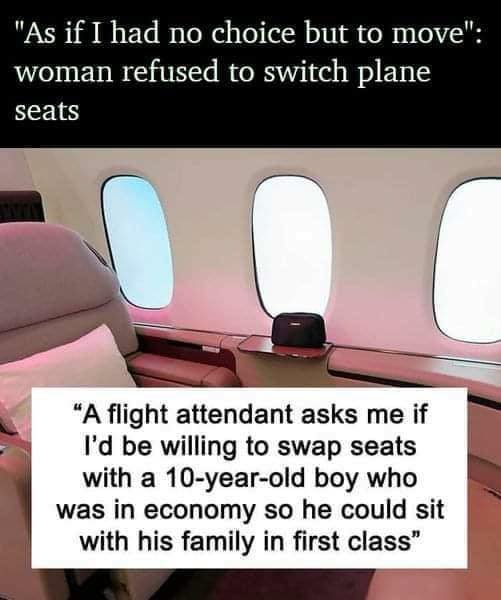Contemporary airlines often seem to test passengers’ patience, as we all know driving across an ocean is not an option. From overbooking flights to charging for luggage and even experimenting with new seating layouts, airline practices can sometimes leave travelers feeling less than valued.
One particular traveler shared her story online after facing a unique situation involving a first-class upgrade she had eagerly accepted for a long-awaited flight. After booking her ticket far in advance and accumulating enough travel points for an upgrade, she boarded the plane excited to experience her first time in first class. However, shortly after takeoff, a flight attendant approached her with an unexpected request—to give up her seat and move to a lower class so a young boy from economy could sit with his family in first class.

Flying first class, as it turned out, wasn’t entirely free of its own set of challenges.
The traveler, a 23-year-old woman, had planned her trip to San Francisco for over a year. She had even booked her flight a full year ahead to ensure everything was set for her travels. Just one or two months before her trip, she received a notification from the airline offering her a complimentary upgrade to first class, thanks to her frequent flyer points and membership status. Needless to say, she was ecstatic. It was her first time flying first class, and she prepared thoroughly, even making use of the amenities in the lounge before boarding.
Once the flight was in the air, she settled in for the long 13-hour journey. However, about an hour after takeoff, a flight attendant came over and asked if she would consider switching seats with a 10-year-old boy who was seated in economy. The flight attendant explained that the boy’s parents, both of whom had also received upgrades, were seated in first class, but their son had not qualified for an upgrade. Consequently, while his parents enjoyed the first-class cabin, he remained in economy, separated from them.
The flight attendant presented her with alternatives, suggesting that she really had no choice but to relocate. She was offered a few options: either another free upgrade on a future flight or a full refund of her current upgrade. Politely, she asked if she could simply stay in her assigned seat, as she felt she was being pressured to move. The attendant explained that there were only three upgraded passengers on this flight—the two parents and herself—and no other first-class seats were available. To seat the boy with his family, it made the most sense for him to take her spot.
She reflected on the situation and considered the possible scenarios. If, for instance, first class had been overbooked or if the boy had actually purchased a first-class ticket, she might have viewed things differently. Similarly, if the parents had bought their upgrades, she might have reconsidered. However, since she had earned her upgrade as a reward for her loyalty to the airline, she felt entitled to remain in her seat. Throughout the exchange, the flight attendant remained professional and understanding, accepting her decision without further persuasion. She assured her that the airline would handle the matter in a way that wouldn’t inconvenience her further.
Although the traveler never saw the boy’s parents, as they were seated elsewhere in the first-class cabin, she did face judgment from another passenger nearby. An older woman seated next to her reprimanded her, claiming she was inconsiderate for allowing a young child to travel alone for such a long flight. The notion of a child enduring a 13-hour journey alone is admittedly distressing; however, the traveler observed the boy frequently walking down the aisle to check in with his parents, indicating he wasn’t entirely alone and could visit them whenever needed.
Reflecting on the incident, the traveler wondered if she was wrong for choosing to stay in her seat. After all, she had been granted the upgrade through loyalty to the airline, and the arrangement wasn’t one she had requested or planned. She shared her story with the online community, seeking opinions about whether she had been in the wrong or if she had a reasonable right to keep her seat. In the end, some may argue that a child’s comfort and family unity should be prioritized, but others might say her decision was justified given the circumstances.
While some people are quick to judge, it’s also essential to understand the rights and expectations of loyal customers who have earned certain privileges through their commitment to an airline. She was placed in a difficult position, one where she felt obligated to prioritize her own comfort and the effort she had made to achieve the first-class upgrade. Ultimately, it’s a matter of balancing personal rights with empathy—a tricky judgment call that travelers, like her, sometimes have to navigate.
The online discussion highlighted various perspectives on the matter, but most agreed on one point: while first-class flights come with comfort, the unexpected dynamics onboard often remind us that travel experiences are full of surprises.





